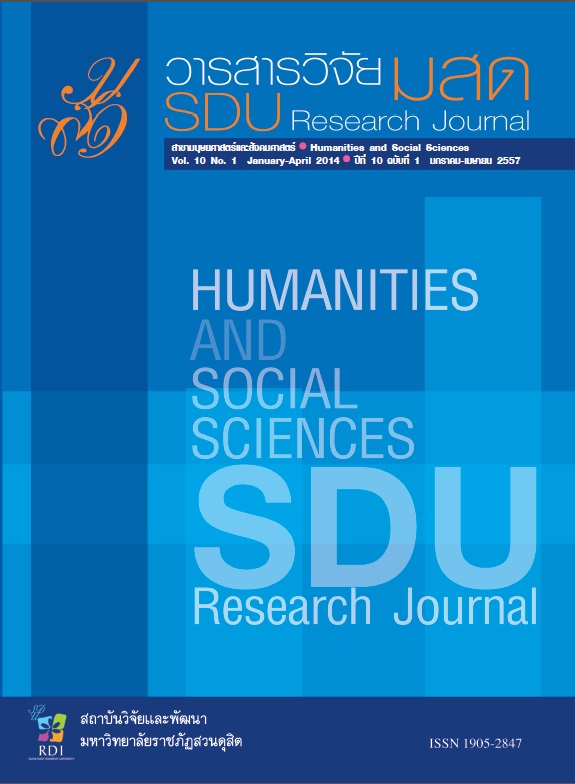ความสำเร็จของนโยบาย “ครัวไทยสู่ครัวโลก” ภายใต้ความร่วมมือระหว่างภาครัฐและเอกชน
Keywords:
นโยบายครัวไทยสู่ครัวโลก ความร่วมมือระหว่างภาครัฐและภาคเอกชนAbstract
บทคัดย่อ
การวิจัยเรื่อง ความสำเร็จของนโยบาย “ครัวไทยสู่ครัวโลก” ภายใต้ความร่วมมือระหว่างภาครัฐและเอกชน มีวัตถุประสงค์ (1) เพื่อศึกษาความสำเร็จในการดำเนินการตามนโยบายครัวไทยสู่ครัวโลกภายใต้ความร่วมมือระหว่างภาครัฐและเอกชน และ (2) เพื่อศึกษาปัญหาและอุปสรรคของการดำเนินงานของนโยบายครัวไทยสู่ครัวโลก อีกทั้ง (3) เพื่อให้ข้อเสนอแนะต่อการดำเนินนโยบายครัวไทยสู่ครัวโลกภายใต้ความร่วมมือระหว่างภาครัฐและเอกชนให้ประสบความสำเร็จมากยิ่งขึ้น วิธีการวิจัยใช้การวิจัยแบบผสม ระหว่างการวิจัยเชิงคุณภาพและการวิจัยเชิงปริมาณ เก็บรวบรวมข้อมูลโดยการสัมภาษณ์เชิงลึกจากผู้ให้ข้อมูลสำคัญจำนวน 17 คน และการสนทนากลุ่มกับผู้ประกอบการ จำนวน 10 คน และการวิจัยเชิงปริมาณ ที่เก็บรวบรวมข้อมูลจากกลุ่มตัวอย่างที่เป็นเจ้าหน้าที่ภาครัฐ ผู้ประกอบการ 70 คน การวิเคราะห์โดยใช้โปรแกรมสำเร็จรูป ในการวิเคราะห์ข้อมูลพื้นฐานทางสถิติ ได้แก่ ค่าความถี่ (Frequency) ค่าร้อยละ (Percentage) ค่าเฉลี่ย (Mean : χ ) ค่าเบี่ยงเบนมาตรฐาน (Standard Deviation : S.D.) เมื่อนำผลการวิจัยทั้งเชิงคุณภาพและเชิงปริมาณมาวิเคราะห์แล้วสามารถสรุปได้ 3 ประเด็น
(1) ความสำเร็จในการดำเนินการตามนโยบายครัวไทยสู่ครัวโลกภายใต้ความร่วมมือระหว่างภาครัฐและเอกชน พบว่า มูลค่าทางการค้าที่เพิ่มสูงขึ้นมาจากการเพิ่มฐานข้อมูลในการวิเคราะห์โอกาสทางการค้าจาก
ปัจจัยภายในและปัจจัยนอก อีกทั้งการดำเนินงานของนโยบายครัวไทยสู่ครัวโลกส่งผลให้ความหลากหลายของสินค้าทางเกษตรของไทยเพิ่มมากขึ้น โดยความคิดเห็นต่อการความสำเร็จของนโยบายครัวไทยสู่ครัวโลกในภาพรวมมีค่าเฉลี่ยเท่ากับ 4.20 และค่าเบี่ยงเบนมาตรฐานเท่ากับ .53
(2) ปัญหาและอุปสรรคของการดำเนินงานของนโยบายครัวไทยสู่ครัวโลก พบว่าการประสานงานระหว่างระหว่างภาครัฐกับเอกชนมีข้อบกพร่องส่งผลให้ผู้นำเข้าและผู้ส่งออกสินค้ามีการดำเนินงานของนโยบายที่แตกต่างกัน นอกจากนั้นอาจมีการต่อต้านนโยบายจากผู้ประกอบการในลักษณะของการดำเนินนโยบายที่ไม่เป็นไปตามมาตรฐาน
(3) ข้อเสนอแนะต่อการดำเนินนโยบายครัวไทยสู่ครัวโลกให้ประสบความสำเร็จต้องวางกลยุทธ์ 5 ประเด็น ได้แก่ 1) กลยุทธ์การจัดการด้านงบประมาณ 2) กลยุทธ์การบรูณาการหน่วยงานรัฐ 3) กลยุทธ์การบริหารความร่วมมือของรัฐและเอกชน 4) กลยุทธ์การสร้างแบรนด์อาหารไทย 5) กลยุทธ์การสร้างการรับรู้และตระหนักถึงต้นตำหรับของอาหารไทย
คำสำคัญ : นโยบายครัวไทยสู่ครัวโลก ความร่วมมือระหว่างภาครัฐและภาคเอกชน
Abstract
The objectives of the study were 1) to study the success of the Thai Kitchen to the World policy which was conducted with cooperation between public and private sectors. 2) to study the problems and obstacles of the implementationof the Thai Kitchen to the World policy and 3) to provide suggestions for policy implementationin the future. The researcher employeda mixed-method in this study. The qualitative data were collected from 17 informants participating in in-depth interviews and 10 entrepreneurs participating in a group discussion. The quantitative data were collected from a questionnaire filled in by 70 governmental officials and entrepreneurs. Quantitative data were analyzed by descriptive statistics (frequency, percentage, arithmetic mean and standard deviation). The research findings revealed the following:
1) An increase in trade values resulted from an expanding database which was used to analyze internal and external factors. Implementation of the policy caused an increase in diversity of Thai agricultural products. The informants agreed that the policy is successful (M = 4.20, S.D. = 0.53).
2) Regarding the problems and obstacles of policy implementation, there were some flaws in cooperation between public and private sectors. The flaws resulted in varying conducts among the importers and exporters. The samples also expressed frustration withthenon-standardized implementation of the policy.
3) The strategies suggested for policy implementation are related to allocation of budget, integration of governmental agencies, management of the public/private sector partnership, recognition of Thai food brands, and creation of perception and awareness of authentic Thai foods.
Key words : Thai Kitchen to the World Policy, Public and private sector cooperation








